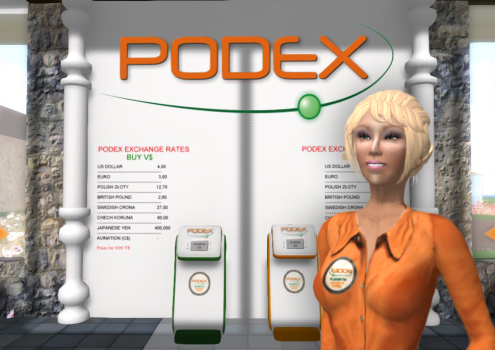
Genesis Metaverse, a commercial grid that emerged last fall from the collapse of Avi-Labs, has been having problems with its currency vendor, Podex, and took the dispute public today.
For residents, this means that they will now buy and sell their currency directly from the grid and not from Podex, and will not be able to use Podex to transfer their currency to other grids.
Genesis Metaverse is claiming that Podex owes it $700, and has cut off Podex from the grid.
Grid owner Cliff Hopkins said that he is planning legal action.
“At this point, our trust in third-party currency is shot,” he told Hypergrid Business.
It is not clear what actually happened here. Hopkins has posted what he claims to be transcripts of online conversations confirming the obligation.
Podex CEO Jacek Shuftan told Hypergrid Business that the real story is very different.
No losses to residents
Hopkins promised that residents will not lose any money as a result of the dispute, even if they bought from Shuftan.

“We will be honoring all currency that was purchased though him,” he said. “If any of the members wish to cash out they can do through us even if they originally purchased it from Podex.”
Hopkins said that he had to give Podex money in order to get started with that exchange, and now wants that money back.
That’s not the way it works, Shuftan told Hypergrid Business. “I never charge any money for using the Podex service.”
He said that he tried to work things out with the grid, but then the grid cut off relations and went public with the dispute.
“The owners decided that Podex is not allowed to service Genesis Metaverse and banned my avatar,” he said. “So Podex can not proceed any transactions there.”
In addition, Podex users will no longer be able to transfer money between Genesis Metaverse and other grids, he said.
“Because the situation is unpleasant not only for me but first of all for all avatars who used intergrid transfers and now they can not, Â I kindly ask Genesis Metaverse management to calm down their nerves and reconsider their decision,” he said.
However, according to Hopkins, it was Podex that shut down service first.
“Podex is no longer permitted to trade after breaking his contract with us by suspending trading to try and get a better deal,” he said.
Before today, residents were able to buy currency from both the Genesis Metaverse grid, and from Podex, and also to sell their virtual currency in both places.
This meant that, say, someone could buy a bunch of virtual currency from Podex, then sell it back to the grid.
That requires some cooperation between the grid and Podex to keep things balanced, in the form of transfers of the virtual currency, and, this apparently, is where the dispute comes from.
How Podex works
According to Shuftan, grids typically use Podex in one of two ways.
One is that they let Podex handle everything. All the grid has to do is come up with a name for their currency. Podex sells it, buys it, handles all the security issues, and makes money from the commissions it charges. No actual money ever needs to change hands between Podex and the grid.
To get the ball rolling, Podex has to have some of the virtual currency to start with, and here the grid gives Podex permission, to, basically, print money.
This is the way 3rd Life Grid did it.
“When we started the grid, I had Podex handle the money right from the start and I had to give them 500,000 of our virtual currency to start,” 3rd Life Grid spokesman Gary Justus told Hypergrid Business. He confirmed this was all virtual currency, not real money.
The other option is where the grid itself controls all the money, and Podex is just the reseller. This is how it worked with Second Life, for example.
“In such case I buy coins from grid owners, and resell them but I can not guarantee that I will buy all the coins from the grid,” said Jacek.
Either way, the grid itself doesn’t have to pay any money to Podex.
All the details are posted on the Podex website. “It is not a secret,” said Shuftan.
Other grid owners happy with Podex system
Many grids currently use or otherwise participate in the Podex system, including 3rdLife Grid, Adult Grid, Baller Nation Grid, Digiworldz, Discovery Grid, Dreamscape Grid, Emilac, Genesis Global Journey, Great Canadian Grid, GreekLife World, InWorldz, Island Oasis, Konk Grid, Lost Paradise, My Virtual Community, Neverworld Grid, Sinful Grid, The Encore Escape, Venture Worldz, Virtual Highway, Virtual Life Brasil, YrGrid, and ZanGrid.

“We are indeed using Podex and have never had any issues with them at all,” said Digiworldz grid owner Terry Ford. “We have been well supported.”
Digiworldz opted to have Podex handle the entire currency system, he said.
“We do not get involved with currency at all, we simply provide the framework required for Podex to operate,” he said.
Baller Nation also uses Podex and the platform works well.
“i am unaware of any problems with Podex,” said Monique Bartley, who is also known as Malani Baller in-world. “As far as I know, no one has complained on my grid of any issues.”
Another grid that uses Podex for its currency is ZanGrid.
“We never had any issues with Jacek at all,” said ZanGrid co-founder Suzan de Koning-Moennink. “He is very correct and gives very good service. Yes, he does take a part of the money during exchanging, but he needs to earn a bit and pay his bills as well.”
She said she was shocked to see that Genesis Metaverse took this dispute public.
“They should know better then this,” she said. “So unprofessional to spread this in the open. The members do not know how this works and yet they all have an opinion based on wrong and false information.”
The Adult Grid uses the other option, where Podex is just a reseller of its virtual currency, and has also had no issues.
“Podex has ATMs that allow users to buy the grid’s currency, but Podex does not provide the entire currency system, said grid co-founder Constanza Amsterdam.
“We are not aware of any issues, so I don’t see any reasons for TAGgers to be worried,” she said.
Why use a third party currency provider at all?
Most commercial grids offer some form of in-world currency, to allow for easy transactions between residents. But running your own currency is difficult and risky. Avination, for example, lost more than $125,000 to fraud.
As a result, grids turn to third-party service providers. Podex is currently the most popular, but Gloebit has recently been gaining ground. Another option is the Open Metaverse Currency from Virwox, but grids have been complaining about lack of support and adoption has stalled. We do not currently have any grids in our database listed as using this currency.
Other grids have no currency at all, or use a fictional currency with no monetary value, or use PayPal, though that expensive and unwieldy for in-world purchases.
It is also possible to have multiple currencies on the same grid.
For example, several grids that run their own currencies, or use Podex as the currency provider, are also experimenting with Gloebit on some regions.
When grids run their own currencies, those currencies can only be used on that grid, and cannot be used during hypergrid shopping trips to other grids. They can be traded for other currencies, but only if the grid has an arrangement with a currency exchange, such as Podex.
Grids that use Podex as their currency provider also have a unique, local currency that only only be used on their grid. Residents can also use the Podex exchange to trade their currencies for those other grids.
The Gloebit currency can be used by hypergrid shoppers on any grid that supports it. It has recently enabled cash-outs and is now in use on about 17 grids.
- OSgrid back online after extended maintenance - April 16, 2025
- Analysts predict drop in headset sales this year - March 25, 2025
- OSgrid enters immediate long-term maintenance - March 5, 2025
